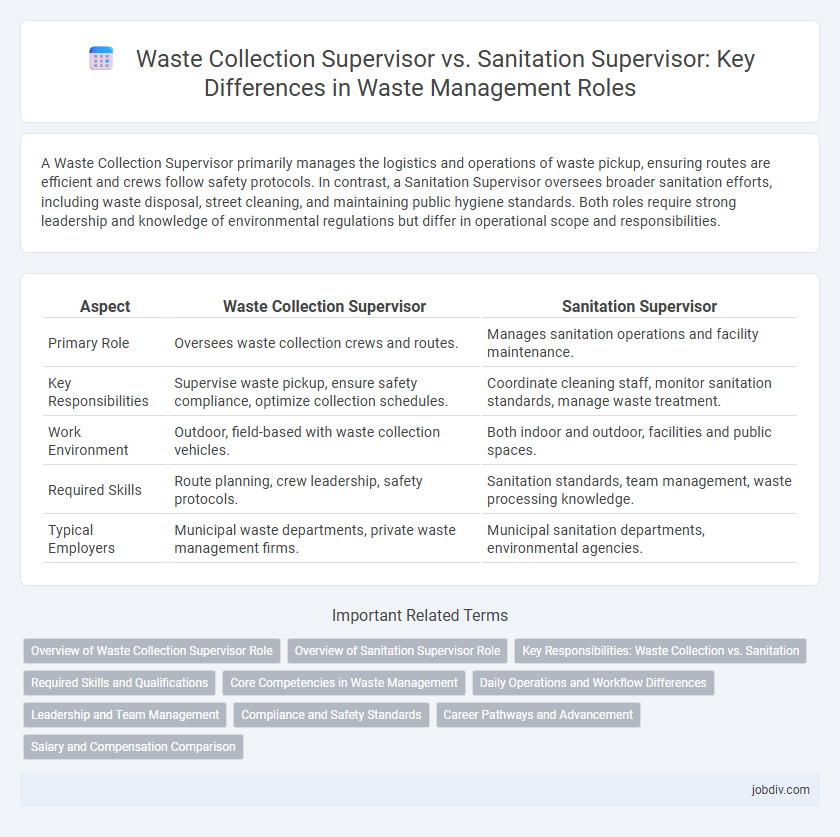A Waste Collection Supervisor primarily manages the logistics and operations of waste pickup, ensuring routes are efficient and crews follow safety protocols. In contrast, a Sanitation Supervisor oversees broader sanitation efforts, including waste disposal, street cleaning, and maintaining public hygiene standards. Both roles require strong leadership and knowledge of environmental regulations but differ in operational scope and responsibilities.
Table of Comparison
| Aspect | Waste Collection Supervisor | Sanitation Supervisor |
|---|---|---|
| Primary Role | Oversees waste collection crews and routes. | Manages sanitation operations and facility maintenance. |
| Key Responsibilities | Supervise waste pickup, ensure safety compliance, optimize collection schedules. | Coordinate cleaning staff, monitor sanitation standards, manage waste treatment. |
| Work Environment | Outdoor, field-based with waste collection vehicles. | Both indoor and outdoor, facilities and public spaces. |
| Required Skills | Route planning, crew leadership, safety protocols. | Sanitation standards, team management, waste processing knowledge. |
| Typical Employers | Municipal waste departments, private waste management firms. | Municipal sanitation departments, environmental agencies. |
Overview of Waste Collection Supervisor Role
A Waste Collection Supervisor manages daily operations of waste pickup teams, ensuring efficient route execution and compliance with safety standards. This role involves coordinating schedules, monitoring equipment maintenance, and training staff to optimize collection efficiency. Unlike a Sanitation Supervisor who oversees broader environmental cleanliness and facility sanitation, the Waste Collection Supervisor specifically focuses on municipal or commercial waste collection logistics.
Overview of Sanitation Supervisor Role
A Sanitation Supervisor oversees waste management operations, ensuring compliance with health and safety regulations while coordinating sanitation crews to maintain cleanliness in public and commercial areas. This role involves monitoring waste disposal processes, managing schedules, and implementing sanitation protocols to prevent environmental contamination and public health risks. Sanitation Supervisors work closely with municipal agencies to enforce sanitation standards and facilitate efficient waste removal services.
Key Responsibilities: Waste Collection vs. Sanitation
Waste Collection Supervisors manage the efficient pickup and transportation of residential, commercial, and industrial waste, ensuring routes are optimized and safety protocols are followed. Sanitation Supervisors focus on maintaining cleanliness and hygiene in public spaces by overseeing street cleaning, graffiti removal, and waste disposal compliance. Both roles prioritize environmental health but diverge in operational scope--waste collection emphasizes logistics and vehicle management, while sanitation centers on public area maintenance and sanitation standards.
Required Skills and Qualifications
Waste Collection Supervisors require strong organizational skills, knowledge of waste management protocols, and experience with route planning and fleet coordination to ensure efficient waste pickup. Sanitation Supervisors need expertise in health and safety regulations, staff training in sanitation procedures, and the ability to conduct inspections to maintain cleanliness standards. Both roles demand leadership abilities, proficiency in reporting tools, and a solid understanding of environmental compliance regulations.
Core Competencies in Waste Management
Waste Collection Supervisors excel in route optimization, personnel management, and adherence to safety protocols to ensure efficient waste pickup and transportation. Sanitation Supervisors focus on overseeing waste treatment processes, maintaining compliance with environmental regulations, and coordinating sanitation crews to promote public health. Both roles require strong knowledge of waste classification, hazardous materials handling, and effective communication skills to enhance overall waste management operations.
Daily Operations and Workflow Differences
Waste Collection Supervisors manage the scheduling and routing of collection vehicles, ensuring timely pickup of residential and commercial waste with efficient crew deployment. Sanitation Supervisors oversee the broader sanitation services, including street cleaning, public space maintenance, and coordination with waste disposal sites to maintain community hygiene standards. Their workflows differ as Collection Supervisors focus on operational logistics for waste pickup, while Sanitation Supervisors handle multiple sanitation activities requiring diverse team management and resource allocation.
Leadership and Team Management
A Waste Collection Supervisor is responsible for coordinating daily waste pickup routes, ensuring timely service, and managing collection crews with a focus on operational efficiency and safety compliance. In contrast, a Sanitation Supervisor oversees broader sanitation operations, including waste processing and facility maintenance, while leading diverse teams to uphold environmental standards and workplace safety. Both roles require strong leadership and team management skills, but the Waste Collection Supervisor emphasizes field logistics, whereas the Sanitation Supervisor focuses on overall sanitation program effectiveness.
Compliance and Safety Standards
Waste Collection Supervisors ensure strict adherence to local, state, and federal environmental regulations, managing teams to maintain high compliance standards during waste pickup operations. Sanitation Supervisors focus on enforcing workplace safety protocols, including OSHA guidelines, to minimize hazards and promote safe handling of hazardous and non-hazardous waste materials. Both roles prioritize regulatory compliance but diverge in operational focus, with Waste Collection Supervisors targeting regulatory adherence in waste transportation and Sanitation Supervisors emphasizing on-site safety and sanitation practices.
Career Pathways and Advancement
Waste Collection Supervisors typically oversee teams managing residential and commercial waste pickup, focusing on route efficiency and safety compliance, offering pathways toward operations management or logistics coordination roles. Sanitation Supervisors manage broader public cleanliness efforts, including waste disposal, street cleaning, and recycling programs, leading to advancement opportunities in environmental services administration or public works leadership. Both roles require strong organizational skills and knowledge of waste management regulations, with career advancement often supported by certifications in safety, environmental health, or municipal management.
Salary and Compensation Comparison
Waste Collection Supervisors typically earn an average salary ranging from $45,000 to $60,000 annually, reflecting responsibilities such as managing garbage truck routes and crews. Sanitation Supervisors often receive higher compensation, with salaries between $50,000 and $70,000 per year, due to broader oversight of waste management operations, including facility sanitation and environmental compliance. Salary differences are influenced by job scope, geographic location, and employer size, with Sanitation Supervisors generally commanding higher wages for their expanded managerial roles.
Waste Collection Supervisor vs Sanitation Supervisor Infographic

 jobdiv.com
jobdiv.com